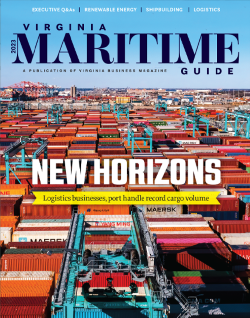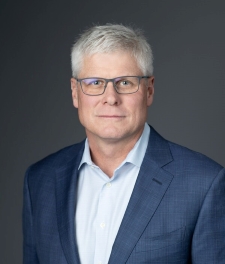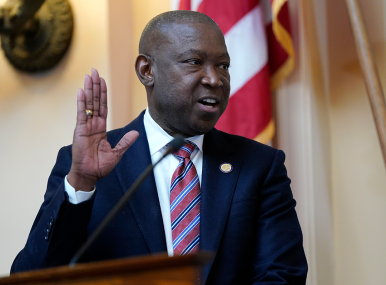Thirty-nine companies headquartered in Virginia are on Fortune magazine’s 70th annual Fortune 1000 list, with 24 Virginia companies again making the elite Fortune 500.
Several of the Virginia companies saw their fortunes rise this year on the list, with top-ranked Virginia company Freddie Mac moving up nine spots to No. 36 on the overall Fortune 500, posting $108.05 billion in revenue for 2023. The federally sponsored mortgage enterprise’s former CEO, Michael J. DeVito, retired earlier this year, with company President Mike Hutchins appointed as interim CEO.
Meanwhile, Virginia’s second-ranked company, beleaguered aerospace and defense contractor Boeing, rose six spots to No. 52 on the Fortune 500, with $77.79 billion in revenue posted last year. Boeing President and CEO Dave Calhoun plans to step down by the end of the year, an announcement that came in March amid ongoing bad press over production problems and fallout from a high-profile January incident in which a 4-foot wall panel blew out of a Boeing 737 Max 9 jet cabin in mid-air. The Justice Department informed a federal judge on May 14 that Boeing violated terms of a settlement allowing the company to avoid prosecution in relation to two deadly 737 Max crashes in 2018 and 2019. Prosecutors have until July 7 to inform the court whether the federal government will take action against Boeing.
Fellow aerospace and defense company RTX, formerly known as Raytheon Technologies, is Virginia’s third-ranked company on the Fortune 500 this year, with $68.9 billion in 2023 revenue, rising two spots to No. 55. Raytheon rebranded as RTX in June 2023 as part of a business reorganization that saw RTX consolidate into three business units: aerospace and defense technology supplier Collins Aerospace, headquartered in Charlotte, North Carolina; aerospace manufacturer Pratt & Whitney, headquartered in East Hartford, Connecticut; and Arlington-based Raytheon, which includes the company’s former Raytheon Intelligence & Space and Raytheon Missiles & Defense segments.
Released Tuesday, the Fortune 1000 list ranks the 1,000 largest United States corporations by total revenue, including public companies and private companies for which revenue information is available.
The past year has been a good one for aerospace and defense in Virginia, evidently, with McLean-based V2X rocketing 155 slots on the Fortune 1000 this year, up to No. 752. V2X, which will see Peraton Chief Operating Officer Jeremy Wensinger taking over as V2X’s CEO from Chuck Prow this month, formed in 2022 from the $2.1 billion merger of Colorado-based government contractor Vectrus and Mississippi-based The Vertex Co. The company reported 2023 revenue of $3.96 billion, up 8% over 2022.
Also notable this year is McLean-based global hotelier Hilton, which jumped 42 spots to No. 389 on the Fortune 500, cementing its post-pandemic turnaround after dropping off the Fortune 500 in 2021 and 2022. Hilton posted $10.24 billion in 2023 revenue, up from $8.77 billion the previous year.
The company with the biggest slide on this year’s Fortune 1000 list was newspaper publisher Gannett, which sank 65 slots to No. 966. Previously based in McLean, Gannett moved its headquarters to New York in March. Tysons-based Tegna, the nation’s largest owner of NBC-affiliate TV stations, dropped 52 spots, to No. 908. Fortune 500 IT company DXC Technology in Ashburn slipped 39 places to No. 294.
Last year, 36 Virginia companies made the Fortune 1000 list, with 24 on the Fortune 500.
This year, 10 Virginia Fortune 500 companies are based in Fairfax County, retaining its status as the Virginia locality with the most Fortune 500 companies. The metro Richmond area, including Hanover, Henrico and Goochland counties, has the second most companies on the Fortune 500, with eight companies. Arlington County has three companies on the Fortune 500.
These are the Virginia-based companies that made the 2024 Fortune 1000 list, in order of ranking:
36) Federal Home Loan Mortgage (“Freddie Mac”), McLean
52) Boeing, Arlington County
55) RTX, Arlington County
84) Performance Food Group, Goochland County
91) Capital One Financial, McLean
104) General Dynamics, Reston
109) Northrop Grumman, Falls Church
141) CarMax, Goochland County
143) Dollar Tree, Chesapeake
196) Altria Group, Henrico County
230) Dominion Energy, Richmond
262) Markel Group, Glen Allen
266) Leidos, Reston
294) DXC Technology, Ashburn
319) AES, Arlington County
357) Huntington Ingalls Industries, Newport News
388) Owens & Minor, Mechanicsville
389) Hilton, McLean
406) NVR, Reston
422) Booz Allen Hamilton, McLean
429) Beacon Roofing Supply, Herndon
453) Arko, Henrico County
477) Genworth Financial, Henrico County
479) Science Applications International Corp. (SAIC), Reston
525) CACI International, Reston
608) Parsons, Centreville
653) Maximus, Reston
655) Brink’s, Henrico County
657) Navient, Herndon
691) ASGN, Glen Allen
694) Graham Holdings, Arlington County
752) V2X, McLean
908) Tegna, Tysons
941) AvalonBay Communities, Arlington County
956) NewMarket, Richmond
957) Park Hotels & Resorts, Tysons
966) Gannett, McLean
979) Universal Corp., Richmond
999) BWX Technologies, Lynchburg




